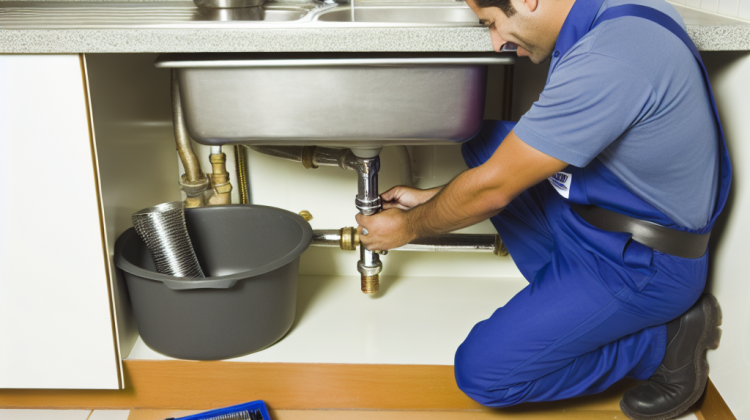
Did you know that the word “plumber” comes from the Latin word “plumbum,” which means lead? Way back in the day, plumbers used lead pipes to carry water. Plumbing has come a long way since then! Today, it’s all about keeping our homes safe and our water flowing. Plumbing is such an important job. If there’s a leaky pipe, it can turn into a big mess, and nobody wants to deal with that!
Plumbing dates back thousands of years, with ancient civilizations, like the Romans, creating complex systems to bring water into their cities. They had aqueducts that carried water from faraway rivers! Fast forward to today: modern plumbing is crucial. It helps us drink clean water, take showers, and even flush toilets! Without plumbers, we’d be in a real pickle, dealing with some nasty plumbing issues.
Imagine waking up in the morning only to find a puddle in your kitchen from a leaky faucet. What a hassle! But here’s the kicker: according to the American Water Works Association, more than 1 trillion gallons of water are wasted each year because of leaks. That’s enough to fill over 1.5 million swimming pools! By fixing leaks quickly, plumbers save not just water but also money on our water bills. Talk about a win-win!
When it comes to fixing pipes, a plumber needs some serious skills! First, they analyze the problem. It might be a clogged drain or a broken water heater. After that, they get to work. They often use tools like wrenches, snake tools, and pliers to tackle the job. Can you believe they’ve got to know how to read blueprints, too? That way, they can figure out where everything goes and how to make it work smoothly.
You might think plumbing is only for fixing leaks or clogs, but it’s also about installations. If a family wants a shiny new bathroom or wants to set up a laundry room, they call a plumber. It’s almost like being an artist! They shape pipes and design systems to make life easier for us. You know what they say, “A plumber’s work is never done!” They’re always on call, ready to dive into action when we need them.
Every day, plumbers save the day, whether it’s fixing a minor issue or dealing with a major emergency. They keep our lives running smoothly and ensure our drinking water is safe. It’s a vital service that’s often overlooked. So the next time you turn on your faucet or take a warm shower, remember to give a little nod of appreciation to the skillful plumbers who make it all possible!
How to Become a Plumber
Wanna know how to become a plumber? Well, it’s not as tough as it sounds! Plumbers do lots of important work, like fixing leaks, installing pipes, and making sure toilets flush right. If you’re interested in this trade, buckle up, because here’s how to get started!
Get the Right Education
First of all, you don’t have to go to college, but you do need to hit the books a bit! Most plumbers start by finishing high school. There are classes in science and math that can really help. Some folks even take special plumbing courses at trade schools. These classes teach you about pipes, drains, and tools of the trade!
Find an Apprenticeship
Next up, you should look for an apprenticeship. This is kinda like a job where you learn the ropes while working with a pro! You get hands-on experience and can ask tons of questions. Usually, apprenticeships last about four to five years. You’ll learn things like how to read blueprints and fix different kinds of plumbing problems.
Get Licensed
Now, here’s the big deal. Most places require plumbers to get a license. After your apprenticeship, you’ll need to pass a test. This test checks what you learned about plumbing codes and safety. It’s super important because it keeps everyone safe and ensures the work is done right!
Pick Your Specialty
Did you know there are different kinds of plumbing? Yep! Some plumbers work on residential buildings, while others might focus on commercial ones. There are also those who specialize in things like gas lines or water quality. Figuring out what you love best can really boost your plumbing career!
Tools of the Trade
Every plumber needs a set of tools, so let’s break it down. Your toolkit should include:
- Wrenches to tighten things up
- Pipe cutters to snip away
- Plumbing snakes to clear clogged drains
- Safety gear, like gloves and goggles
Having the right tools makes the job a whole lot easier!
Working Conditions
Now, you might be wondering what it’s like to actually work as a plumber. Well, get ready for a mix! Some days, you’ll be inside homes, fixing sinks and toilets. Other days, you could be working outside, digging trenches or dealing with a leaky main line. The work can be messy, so if you don’t mind getting your hands dirty, you might just love it!
Keep Learning
The plumbing world keeps changing. New tools and techniques pop up all the time. To stay sharp, it’s good to take extra classes or go to workshops. This not only helps you be the best plumber you can be, but it also opens doors to new opportunities.
And hey, did you know that according to the Bureau of Labor Statistics, plumbing jobs are expected to grow by 5% from 2019 to 2029? That means there’ll be plenty of chances for new plumbers!
“`html
Plumbers Plumbing FAQ
What is a plumber?
A plumber is someone who fixes and installs things like pipes and toilets. They help with water and gas in our homes!
How can I tell if I need a plumber?
If you see water leaks, hear strange noises from pipes, or have a clog that won’t budge, it might be time to call a plumber.
What should I do if my toilet won’t stop running?
First, check the float in the tank. It might be stuck. If that doesn’t work, you may need to call a plumber to fix it.
Can I fix a leaky faucet myself?
Yes! You can try tightening it or replacing a washer. But if it keeps leaking, a plumber can help you out.
How do I find a good plumber?
Ask friends or family for recommendations. You can also look online for reviews to find a reliable plumber.
What is a plumbing emergency?
A plumbing emergency can be a big leak, a clogged toilet that won’t flush, or broken pipes. When water is everywhere, it’s an emergency!
How much does a plumber cost?
Plumber costs can vary. It might be hourly or a flat fee. Always ask ahead of time so you don’t get surprised!
What can I do to prevent plumbing problems?
- Don’t flush anything but toilet paper.
- Keep drains clean by using a drain cover.
- Check pipes for leaks regularly.
When should I call a plumber?
Call a plumber if you’re having problems you can’t fix, like serious leaks or broken toilets. Don’t wait too long!
Do plumbers give free estimates?
Some plumbers give free estimates, while others might charge a small fee. It’s best to ask when you call!
“`
Wrapping It Up: Plumbing Tips
So, when it comes to plumbing, it’s a lot like keeping a car in good shape. First off, checking for leaks is super important. A small drip can turn into a big mess if you don’t fix it. Plus, remember to clear out the gunk from your sink drains. Just a little bit of cleaning can make a huge difference! Also, always know where your water shut-off valve is. If things go haywire, you can quickly turn off the water and save your home from a flood.
Lastly, don’t forget to use the right tools. A good plunger can be your best friend during a nasty clog. And if you’re in over your head, it’s totally okay to call a pro. Sometimes, knowing when to ask for help is the smartest thing you can do. So, keep your pipes happy, and you’ll have a smooth-running bathroom and kitchen. Happy plumbing, and remember, a little maintenance goes a long way!
